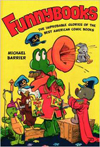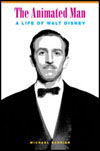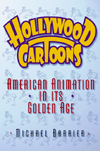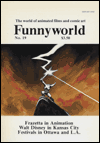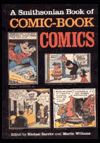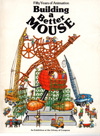
Interviews
I recorded my first interviews with people in animation and the comics in 1969, on my first visit to Los Angeles. Mel Blanc was the first person I interviewed, and in the days that followed I hauled a tape recorder (the reel-to-reel kind—cassette recorders were still very new) to interviews with Chuck Jones, Bob Clampett, Billy Bletcher, Roger Armstrong, Carl Stalling, and Ward Kimball. Future visits to California, and then to New York and other places, yielded hundreds more interviews. Milt Gray was along for many of my interviews, and he recorded many interviews without me in between my visits to L.A.
The idea was to publish the interviews in Funnyworld, at first—the Clampett, Jones, Stalling, and Blanc interviews from my first trip all wound up appearing there—but then Milt and I began recording interviews on a much larger scale as research for Hollywood Cartoons: American Animation in Its Golden Age.
Hollywood Cartoons quotes extensively from thousands of pages of transcripts, but there was no way I could use even a small fraction of the most valuable material. I'm sharing in this section some of the most interesting interviews, in part or complete.
Jack Kinney is best known for his Goofy sports cartoons, and he talked about those cartoons and other aspects of his career as a Disney director in a 1973 interview and again in 1976 (with his wife, Jane) and 1986.
Wilfred Jackson was the most admired by his colleagues of all the Disney directors, and an astute observer of Walt Disney and his studio. Milt Gray and I recorded two interviews with him, in 1973 and 1976, both long and rich with information and insights.
Gerry Geronimi was probably the Disney animation director most criticized by his colleagues, but he makes the case for himself in the interview that Milt Gray and I recorded with him in 1976.
I interviewed the great Disney animators Frank Thomas and Ollie Johnston in 1976 (with Milt Gray) and then again in 1987; the second interview is at this link.
Phil Monroe was a leading animator at Warner Bros. in the 1940s and also worked at UPA and other interesting places. Milt Gray and I interviewed him in Hollywood in 1976; a second Monroe interview, from 1987, is at this link.
Corny Cole was an animator and designer whose name is most closely associated with features like Gay Purr-ee and Raggedy Ann + Andy, but he also had a lot to say about his earliest days in animation, in the Chuck Jones unit at the Warner Bros. studio. Milt Gray and I interviewed him in February 1991, near the end of my research for Hollywood Cartoons: American Animation in Its Golden Age.
Fred Kopietz built a career in Hollywood animation around long stints with Lantz and Disney. He was never a "name," like the "nine old men," but his interview is in many ways an exceptionally complete picture of what it was like to work in the Hollywood studios in the "golden age."
Lynn Karp was a Disney animator who worked on Pinocchio and Fantasia but chose to make his career drawing funny-animal comic books.
Milt Kahl was a great animator for Walt Disney, and easily the most cantankerous of the famed "nine old men." Milt Gray and I interviewed him in November 1976, soon after he left the Disney studio, and he did not hesitate to voice his frustration with the studio's leadership.
John Hubley was the guiding creative force at the UPA studio when it was making its most important films, and he was later, with his wife, Faith, a leading independent animated filmmaker. I interviewed him in November 1976, a few months before his untimely death.
Robert McKimson was the dominant animator at the Leon Schlesinger (Warner Bros.) studio in the 1930s and early 1940s, and then one of the three directors who made most of the Warner cartoons for the next twenty years. My 1971 interview was one of the few with this neglected creator of Looney Tunes.
James Bodrero was an important member of Joe Grant's model department at the Disney studio in the late 1930s and early '40s. Milton Gray interviewed him, as part of the research for Hollywood Cartoons: American Animation in Its Golden Age, in January 1977.
Hugh Harman was, with Rudy Ising, the man who brought Warner Bros. and then MGM into the cartoon business. When I interviewed him in 1973, we talked about his early association with Walt and Harman's ambitions for the animation medium.
Joe Grant was a leading light at the Disney studio in its glory years. I interviewed him in 1988, when we talked about his crucial role in the production of such films as Fantasia, Dumbo, and Make Mine Music. An audio clip accompanies the interview.
Brad Bird wrote and directed The Incredibles, the most exciting animated feature of recent years. I interviewed him on February 16, 2005, a few days before the Academy Awards ceremony at which The Incredibles was a candidate for four Oscars.
Fess Parker burst into stardom sixty years ago, playing Davy Crockett during the first season of Walt Disney's Disneyland TV show. In this interview—a composite of three interviews I recorded in 2003 and 2004—I spoke with him about Walt and about the twists and turns his film career took at the Disney studio and afterwards.
Frank Tashlin was one of the great Warner Bros. cartoon directors, serving two stints under Leon Schlesinger in the late thirties and early forties. In between, he worked on Disney stories during that studio's glory days and headed the Screen Gems studio when it enjoyed its one creative surge. I conducted the interview with him here—one of the few he ever gave, and the only one to discuss his cartoon work in detail—in 1971, a year before his death. An audio clip of roughly a minute accompanies the interview.
Lloyd Turner was a comedy writer for decades, generating laughs with Bob Clampett, Jay Ward, and Norman Lear. He got his start writing cartoon stories for Art Davis at Warner Bros. in the forties, teamed with Bill Scott, and those years are the subject of these extensive interview excerpts.
John McGrew, another Warner Bros. alumnus, designed the groundbreaking Chuck Jones cartoons of the early forties.I interviewed McGrew in 1995, at his home in France. Accompanying this interview is an audio clip of just under a minute, as well as five examples of McGrew's color layouts for such Warner Bros. cartoons as My Favorite Duck and Flop Goes the Weasel.
I recorded several interviews with Art Babbitt, one of Walt Disney's leading animators in the thirties and later one of his most implacable foes. Both sides of his Disney experience are reflected in this 1986 interview, in which Babbitt talks about working on The Country Cousin, one of the most charming of the Silly Symphonies, as well as about his collisions with the studio in court in the early forties. There's an audio clip.
I also recorded a third interview in 1986 with Ward Kimball, another of Walt Disney's great animators. Kimball was always frank and opinionated in our interviews, qualities evident in this transcript, especially in his account of how he fell under the shadow of Walt Disney's disapproval in the early sixties, thanks to a run-in over Kimball's role in the live-action musical comedy Babes in Toyland.
Charles M. Schulz, creator of "Peanuts," was by all reckonings one of the last century's handful of truly great comic strips. I interviewed Schulz in 1988 not for Funnyworld or as part of the research for my book Hollywood Cartoons: American Animation in Its Golden Age, but for an article in the business magazine that employed me at the time. The interview is, accordingly, business-focused, and licensing-focused in particular, but I think its relevance to broader discussions of Schulz's life and career is self-evident.
The first interview excerpts I published on the site were from my 1973 interview with David Hand, Walt Disney's second in command during the production of Snow White and the Seven Dwarfs and Bambi. There's also an audio clip.
Quick Links
New to the site? Click here to go to a page that explains what it's all about.
To comment on anything on the site, write to me at the following address: michaelbarrier@comcast.net. I’ll assume that your comments are intended for publication unless you specify otherwise.
